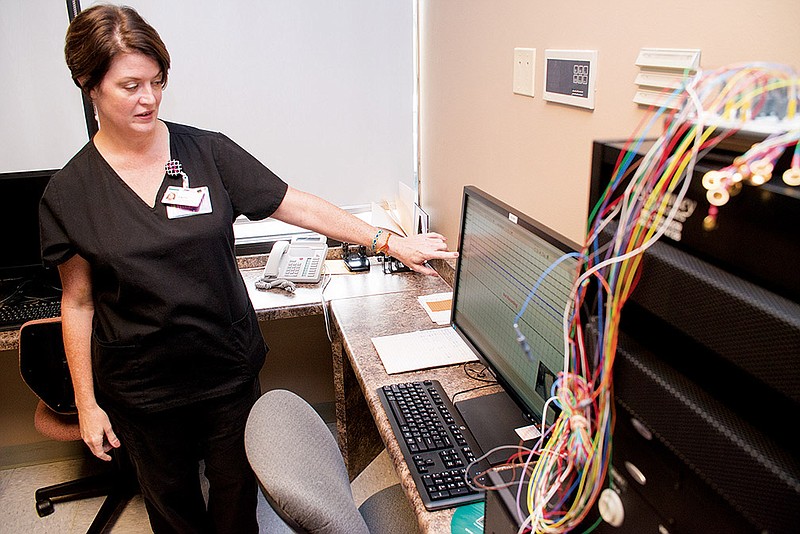Doctors have said a lack of restful sleep can be more serious than patients just feeling tired in the morning.
According to information issued by Baptist Health Medical Center-Hot Spring County, sleep disorders and the sleep deprivation that results can cause problems with brain function and heart rate and have a negative effect on other body systems.
Poor sleep habits or disorders can interfere with a person’s ability to work, drive and or even participate in social activities. According to doctors, most sleep disorders can be managed once they are diagnosed, and Malvern-area residents can now find out if their lack of sleep is one of more than 70 sleep disorders by visiting the medical center’s new Sleep Center.
Sleep disorders can also be a danger to others, because between 1,400 and 1,500 people fall asleep while driving and cause crashes, according to sleep-study experts.
“More than 40 million Americans have some type of sleep trouble,” Doug Weeks, executive vice president and COO of Baptist Health, said during a ribbon-cutting ceremony with the Malvern/Hot Spring County Chamber of Commerce at the medical center on Monday. “Now people who have trouble sleeping, wake up tired or snore loudly can see if they have any serious sleep problems — on Tuesday and Wednesday nights at our sleep lab.”
Located on the ground floor of Baptist Health in Malvern, the Sleep Center has two sleeping rooms and a space equipped for monitoring and testing.
“This is a state-of-the-art, all-brand-new sleep center,” said Ann McQueen, director of patient and community services for Baptist Health in Little Rock. “The most common disorder is sleep apnea, where people will actually stop breathing. The second is restless-legs syndrome, when you cannot rest because your legs have been moving, and you get up in the morning feeling you have been running all night.”
For health care personnel to test a person for sleep disorders, the patient has to sleep. That is why two of the rooms in the Sleep Center have regular beds more like those found in homes than in hospital rooms.
“The people come in about 8 p.m.,” said Patti Reed, coordinator of the Baptist Health Sleep Center in Little Rock. “Since we want to know about how they sleep, we get them in bed quickly so they can eventfully fall asleep.”
Before going to bed, the patient is “wired up” by a sleep-study technician, who glues sensors on the patient’s head and face, as well as on the chest, arms and legs.
“Those sensors will tell us about brain activity, snoring, the amount of oxygen a test subject is breathing and how deeply they are breathing,” Reed said. “[The sensors] also check for eye and leg movement, as well as chin drop.”
Reed said that from the monitors in the control room, a sleep tech can see what problems are occurring during sleep.
“If it is sleep apnea, then the tech will connect the patient to a CPAP machine,” she said. “They will increase the airflow pressure until the person is sleeping easier.”
CPAP stands for continuous positive airway pressure. The machine has a fan that moves at a precise rate. The air travels through a flexible tube to a nose piece, and there are many variations of nose pieces for fit and comfort.
Snoring can be a symptom of sleep apnea.
“Someone with sleep apnea will stop breathing during their sleep, as often as 90 times an hour,” Reed said. “Each time the breathing stops and is then followed by a snore or gasping for breath, the brain wakes for three to five seconds. So a person can wake up sleep-deprived, even if they have been in bed for eight hours.”
With the machine, the sleeper is quiet, still and wakes up more rested. The patient is not sleeping more, just more efficiently, according to information about the sleep disorder.
The Baptist Health Medical Center-Hot Spring County Foundation, a holdover from before the hospital management was passed to Baptist Health, provided $100,000 toward the equipment needed for the sleep lab and the renovations to the hospital rooms at the Sleep Center.
“We are so grateful for Baptist Health and the BHMC-HSC Foundation for making this day possible,” said Shelia Williams, vice president and administrator of the hospital. “The new area of service for residents is yet another in the long list of improvements we’ve been fortunate to make since becoming a part of the Baptist Health System.”
Staff writer Wayne Bryan can be reached at (501) 244-4460 or wbryan@arkansasonline.com.
